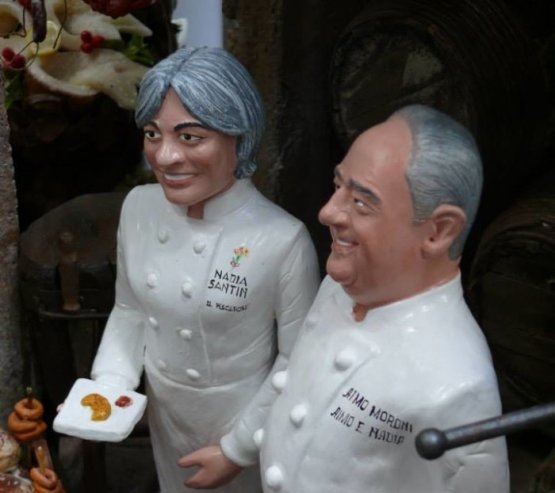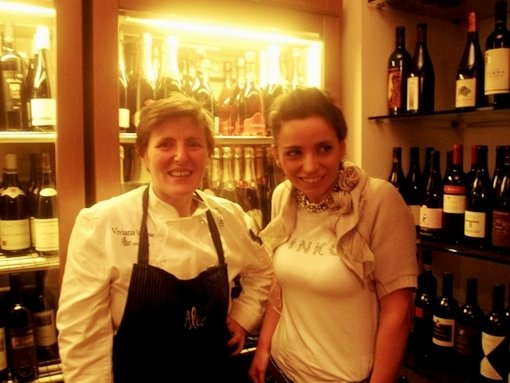Paolo, I start from your latest provocation. No, there certainly aren’t 50 famous women, 50 superstars, who can attract the attention of the media and the public as well as Scabin, Bottura, Cracco and so on. Mind that I didn’t say there aren’t as many good female chefs. Taking into consideration that we are less numerous, in proportion there are as many women who are as talented as the above mentioned chefs. Being talented, however, in this world as well as in others, is not enough if you want to reach some goals. Women don’t have the same media energy men have. And if you attract the public, you attract sponsors, and if you attract sponsors, there’s a lot you can do.

Just a few women in the presepe of chef in San Gregoro Armeno, Naples (in the pic, Nadia Santini and Aimo Moroni)
I’m not complaining, I’m not stamping my feet and crying. Those who know me, know perfectly well that I never complain about this situation, because I really have nothing to complain about, and in any case, complaining is never helpful. I often wonder why and putting aside, for once, the obvious numbers and the cultural reasons (which in fact block the road of many young women who are not admitted to some important kitchens because they are women), and trying to make a quick and basic analysis, I’d say the interesting component to consider is the sexual aura in which male chefs are wrapped.
It’s renown and clear: you just need to look at the picture of a naked Cracco or listen to Scabin speak (their talent is not being questioned, so those who consider them also good looking and fascinating should not be worried) to understand that testosterone has something to do with fame. In fact, to prove this, chefs who are not as talented as the above mentioned ones, perhaps even without the disputes of a restaurant, can be as famous and can attract as much public as a tri-starred restaurant.

Viviana Varese e Marianna Vitale, both from Campania, both with a Michelin star
I don’t believe there are any differences between men and women if not in terms of personality and culture. In this I’m often different from my female colleagues who, as I have understood in the past, sometimes have the opposite opinion. After all, why should I believe that my cultural and training background would not make me differ from a female chef who, for instance, was born and has lived in only one country, if not, in fact, one region? This is a simple realization. Thirty years ago I made some choices that were brave at the time and are still considered “different” so why should I expect that other female chefs, with lives that have been different from my own, would be like me?
The Michelin guide is judged by many (including me) as serious. I don’t have lists of inspectors or any informants and the rare times when an inspector presented himself after the dinner (it happened twice) I’ve always been startled, wondering how you could ever recognise one. I owe a lot to many including the Michelin guide. It was the most forward-looking in my case, more than any other Italian guide ever was.
For a person with my cultural and training background, being “read” by an international clientele has been and is essential. In fact, I will never stop thanking it for the success I’ve received, not only in terms of fame but also of clients, something which allows me today to do what I do in the best possible way. And even when it comes to the question we’re now considering, comparing the number of male and female chefs, I believe the Michelin guide has a good interpretation.